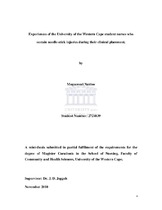| dc.contributor.advisor | Jeggels, J. D. | |
| dc.contributor.author | Naidoo, Mogasweri | |
| dc.contributor.other | Dept. of Nursing | |
| dc.contributor.other | Faculty of Community and Health Sciences | |
| dc.date.accessioned | 2014-01-20T06:44:37Z | |
| dc.date.available | 2011/06/07 06:05 | |
| dc.date.available | 2011/06/07 | |
| dc.date.available | 2014-01-20T06:44:37Z | |
| dc.date.issued | 2010 | |
| dc.identifier.uri | http://hdl.handle.net/11394/2614 | |
| dc.description | Magister Curationis - MCur | en_US |
| dc.description.abstract | An estimated 12 billion injections are administered annually worldwide and result in two million needle sticks each year in health workers. Needle-stick injuries occur worldwide on a daily basis. These injuries are traumatic experiences which if not handled correctly may have devastating psychological effects on the student nurse. The researcher proposed to explore
the lived experiences of student nurses in the undergraduate programme at the University of the Western Cape (UWC), Cape Town, who had sustained needle-stick injuries during their clinical placement to uncover the meaning that these lived experiences had to the student nurses.
The researcher, through her clinical supervision of the BCur undergraduate nursing students at the School of Nursing (SoN), University of the Western Cape (UWC) suspected that needle stick injuries sustained by student nurses are being mismanaged in the service settings and that the phenomenon of a needle-stick injury had far reaching emotional and physical effects on the student nurse. In this study a qualitative phenomenological approach was used because the researcher identified it as the most appropriate method to do this study. The population under study was the student nurses studying towards their BCur nursing degree at the SoN at the UWC. A purposive sample consisting of 8 respondents were selected, aged between 19 and 32.
The data were collected through unstructured, in-depth interviews lasting for about 1 hour. The responses from this type of data collection provided the researcher with ‘rich’ details of the student nurses experiences of the needle-stick injury. The core principles of Phenomenology focus on the ‘lived’ experiences of an individual and the researcher chose the unstructured, in-depth interview to collect the data in this study because it was the most
appropriate method of obtaining the data. Participation in the study was voluntary and informed consent was obtained from the respondents prior to the commencement of the study. An inductive theory was used as a framework to guide the data analysis process because through the process of analysing the data, categories and themes emerge. Findings from the study revealed the following: a needle-stick injury is considered to be a traumatic
incident that students react in various ways to the traumatic incident, that several intervening factors precede the incident and lastly that the students need support following the incident. These research findings indicate a need for the provision of a structured preventive and promotive programme relating to needle-stick injuries for the student nurses. Clinical procedures should be revised to ensure the safety of students when they work with sharp
instruments. The knowledge about policies and procedures relating to the management of needle-stick injuries should be reinforced to both staff and students. | en_US |
| dc.language.iso | en | en_US |
| dc.publisher | University of the Western Cape | en_US |
| dc.subject | Nursing | en_US |
| dc.subject | Study and teaching | en_US |
| dc.subject | South Africa | en_US |
| dc.subject | Nursing students | en_US |
| dc.subject | South African Nursing Council | en_US |
| dc.title | Experiences of the University of the Western Cape student nurses who sustain needle-stick injuries during their clinical placement | en_US |
| dc.type | Thesis | en_US |
| dc.rights.holder | University of the Western Cape | en_US |
| dc.description.country | South Africa | |

